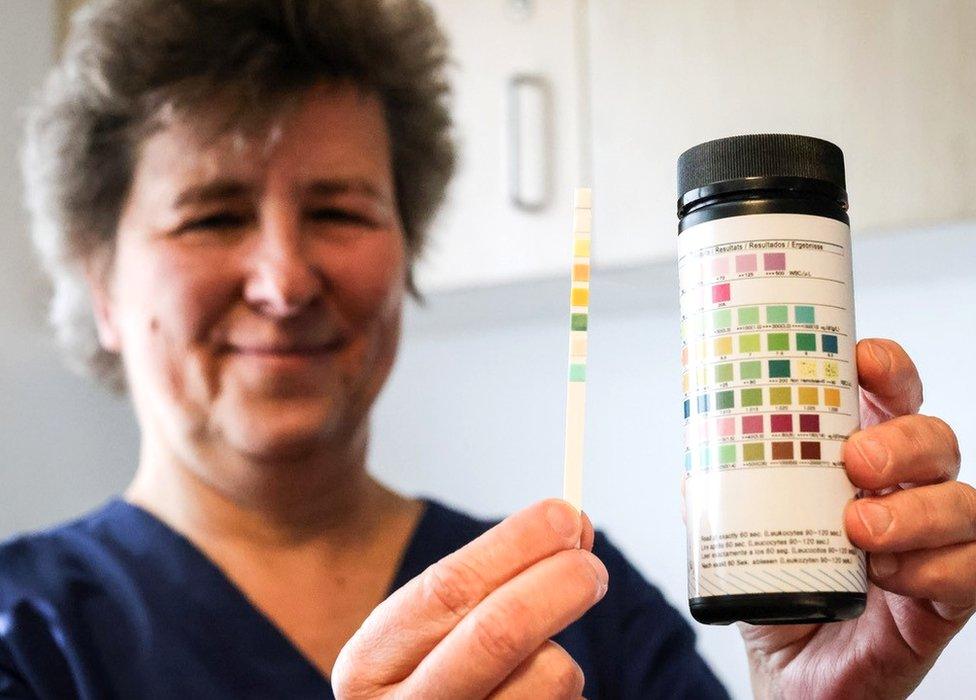'Urinary tract infection left me housebound'
- Published

Leanne Gray says some days her chronic UTI is so painful all she wants to do is curl up on the couch
Women with chronic urinary tract infections (UTI) say the pain can last for years and make it impossible to live a normal life. Some claim the NHS is failing to diagnose and treat the problem, which is leading to severe debilitating symptoms.
Leanne Gray says that some days her chronic UTI is so painful all she wants to do is curl up on the couch.
"It can completely alter your life, some days I am housebound," she says.
The 40-year-old from Aberdeen works as a nurse in intensive care but the severe pain and constant need for the toilet has at times made it impossible for her to do her job.
UTIs are one of the most common infections for women and a little more than half will experience one infection in their lifetime.
The majority access treatment, such as a short course of antibiotics, from their GP or a pharmacy but for some the infection does not go away and they are left in debilitating pain for years.
These women say they are left feeling ignored by their doctors and some even resort to spending thousands of pounds on private treatment.

What are urinary tract infections?
UTIs are usually caused by bacteria, most commonly from their own bowels, entering the urinary tract through the urethra, the tube that carries urine out of the body.
Women have a shorter urethra than men, which means bacteria are more likely to reach the bladder or kidneys and cause an infection.
Symptoms include burning on passing urine and the sensation of needing to pass urine frequently, fever, shivers, and pain.

Dipstick tests
Leanne has suffered with urinary tract infections since she was a teenager but in the past couple of years it has become chronic and the symptoms have been impossible to shift.
Sending a urine sample to the lab is the most reliable test for UTIs but results can take days so GPs often use a faster dipstick test, however, these do not pick up many cases, including Leanne's.

Dr Imran Omar says relying on dipstick testing cannot rule out the possibility of false negative test
Dr Imran Omar says the tests can miss up to half of positive infections.
"If you are relying on dipstick testing and the patients has symptoms of a UTI, you cannot rule out the possibility of false negative test," he says.
"In my opinion these patients need to be tested further."
Dr Omar says: "If the women are having symptoms of UTI and if it's not picked up earlier and if the diagnosis is missed they can develop chronic UTI."
Leanne tested negative for UTIs on a "dipstick test" with an NHS doctor and it was only after she went to a private consultant that her infection was confirmed by further tests.
She is now on a course of treatment which involves long-term high dose antibiotics.
This treatment is unavailable on the NHS but she says these have improved her symptoms.
"I know from the support groups there's been women in treatment for four years and they are starting to feel better," she says.
"I think it's just finding the right combination of antibiotics."

Dr Catriona Morton warns of the danger of antibiotic resistance
However, Dr Catriona Morton, deputy chair of the Royal College of GPs in Scotland says this approach could have worrying side effects.
"We always have to be worried about long-term use of antibiotics because that can cause antibiotic resistance," she says.
Dr Morton says that overuse of antibiotics can reduce their effectiveness for the patient and within society as a whole.
She says the evidence in the NHS Scotland SIGN guidelines is that low dose antibiotics are useful, but use "with caution".
The guidelines say that patients can be treated with antibiotics for a chronic UTI even if their test results are negative, if they are presenting with symptoms.
Dr Morton says if they remain in pain after a standard three-day course of antibiotics women should go back to their GP.
"We don't want to see women left in pain," she says. "But it would be a mistake to assume that this pain is due to a urine infection."
Carolyn Andrew, from the Chronic Urinary Tract Infection Campaign (CUTIC), says there are changes which need to be made in the way these UTIs are treated and recognised.
She calls for more effective testing methods and treatment for chronic UTI to be made available to everyone.
"The tests at the moment are unfit for purpose," she says.
"There needs to be recognition that chronic UTIs exist. At the moment SIGN guidelines do not exist for chronic UTI."
She also called for more research to be done into the condition.